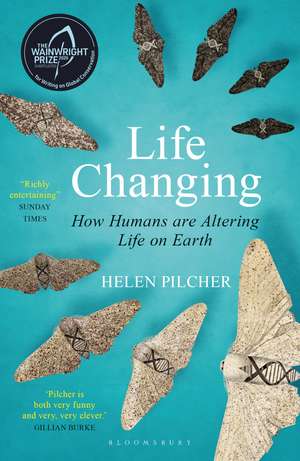Life Changing: SHORTLISTED FOR THE WAINWRIGHT PRIZE FOR WRITING ON GLOBAL CONSERVATION
Autor Helen Pilcheren Limba Engleză Paperback – 23 iun 2021
Preț: 52.93 lei
Preț vechi: 75.80 lei
-30% Nou
Puncte Express: 79
Preț estimativ în valută:
10.13€ • 10.83$ • 8.44£
10.13€ • 10.83$ • 8.44£
Carte disponibilă
Livrare economică 28 martie-11 aprilie
Livrare express 13-19 martie pentru 42.19 lei
Preluare comenzi: 021 569.72.76
Specificații
ISBN-13: 9781472956729
ISBN-10: 1472956729
Pagini: 384
Dimensiuni: 129 x 198 x 28 mm
Greutate: 0.23 kg
Editura: Bloomsbury Publishing
Colecția Bloomsbury Sigma
Locul publicării:London, United Kingdom
ISBN-10: 1472956729
Pagini: 384
Dimensiuni: 129 x 198 x 28 mm
Greutate: 0.23 kg
Editura: Bloomsbury Publishing
Colecția Bloomsbury Sigma
Locul publicării:London, United Kingdom
Caracteristici
Many of the animals described in the book are overlooked from standard formats - dogs, cats and horses don't feature in natural history museums any more than genetically modified mice or fainting goats.
Notă biografică
Helen Pilcher is a science writer and comedian, with a PhD in stem cell biology and years of stand-up comedy under her belt. Helen has worked as a freelance writer for the last 12 years, and she has written for the Guardian, New Scientist, BBC online, BBC Wildlife and Nature, for which she was formerly a reporter.Helen's previous book for Bloomsbury Sigma, Bring Back the King, was Radio 2 'Fact not Fiction' book of the week; it was described by comedian Sara Pascoe as 'science at its funniest'.@HelenPilcher1
Cuprins
IntroductionChapter 1: The Wolf that Rolled OverChapter 2: Strategic Moos and Golden GnusChapter 3: Super Salmon and Spider-GoatsChapter 4: Game of ClonesChapter 5: Screwworms and Suicide PossumsChapter 6: The Age of the ChickenChapter 7: Sea-Monkeys and Pizzly BearsChapter 8: Darwin's MothChapter 9: Resilient ReefsChapter 10: Love IslandChapter 11: Pigs and Purple EmperorsChapter 12: The New ArkAdditional ReadingAcknowledgementsIndex
Recenzii
Tackles how humans are altering existing animal life. It has some good lines and is richly entertaining throughout, but under the surface it is pretty serious.'
Helen Pilcher takes on the unenviable task of describing how our species has been on a collision course, spanning roughly 300,000 years of history, with the rest of life on earth. It shouldn't make for good reading but, mercifully, Pilcher is both very funny and very, very clever.
With warm wit and glorious pace, Life Changing delivers an eloquent commentary on this, the age of post-natural history. Expertly pulling together and detailing the work of hundreds of scientists around the world, Pilcher encourages us to ask timely questions about our role as stewards and curators of a planet struggling under our influence.
Helen Pilcher takes on the unenviable task of describing how our species has been on a collision course, spanning roughly 300,000 years of history, with the rest of life on earth. It shouldn't make for good reading but, mercifully, Pilcher is both very funny and very, very clever.
With warm wit and glorious pace, Life Changing delivers an eloquent commentary on this, the age of post-natural history. Expertly pulling together and detailing the work of hundreds of scientists around the world, Pilcher encourages us to ask timely questions about our role as stewards and curators of a planet struggling under our influence.
